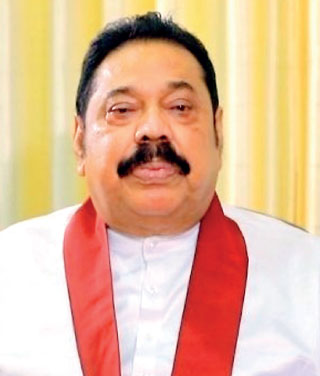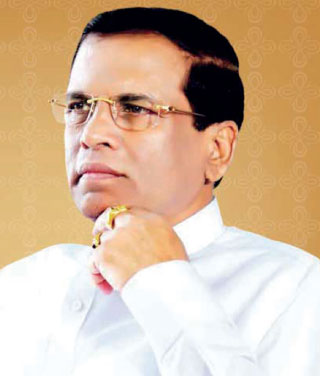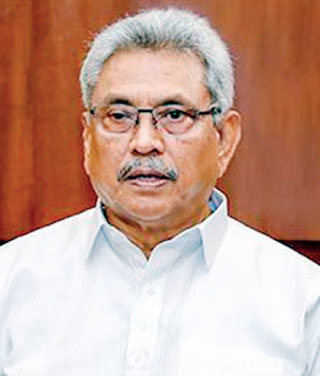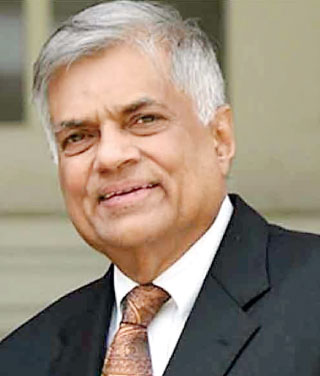Saturday Feb 21, 2026
Saturday Feb 21, 2026
Monday, 8 August 2022 01:51 - - {{hitsCtrl.values.hits}}

Mahinda Rajapaksa

Maithripala Sirisena

Gotabaya Rajapaksa

Ranil Wickremesinghe
|
 Six hundred articles over eleven and a half years
Six hundred articles over eleven and a half years
This is the 600th article in this series commenced from January 2011. It appeared every Monday without failure. They educated the readers of the local as well as global economic issues of the day. The objective of the series was to simplify the complex and incomprehensible economic issues for the benefit of those who have no previous formal training in economics. Hence, the target group was not formal economists but those who are engaged in other professions like medicine, engineering, or science, to mention but a few.
But from the feedback that was received, the regular readership had expanded to students, formal economists, and policymakers as well. There had been readers from Sri Lanka as well as from overseas. After accessing these articles through search engines in the internet, there had been inquiries for further clarifications or expressions of disagreeing views about articles that had been published as far back as 2010s. According to Google scholar’s indices, there had been many citations of these articles in scholarly papers.
Policymakers ignoring the message
Though the readers had welcomed these articles, that had not been the case with policymakers. The period had covered three policy regimes, namely, the first Mahinda Rajapaksa regime, the Ranil Wickremesinghe regime of 2015 to 2019, most recently the Gotabaya Rajapaksa regime since 2019. The critical analysis provided in these articles was not to the liking of the chief policymakers associated with these regimes. There had been many counter attacks, sometimes descending to a personal level, by the architects of policy in these regimes. But the series continued without any break or departure from its original mission.
|
The seeds of the current crisis
It is time to review some of the contentious issues raised in these articles.
The seeds of the current economic crisis with no adequate foreign currency earnings to maintain the essential import program was sown in early 2010s by adopting a policy of concentrating on the domestic economy based economic growth by the second Mahinda Rajapaksa administration. In this policy, the export sector was not given the due recognition it deserved. In an article published in March 2011, the Government was advised that complacency in this respect was its biggest enemy and there should be a shift in policy from domestic economy based economic growth to export promotion (available at: https://www.ft.lk/columns/exportse28099-dillemma-complacence-is-the-worst-enemy/4-24406).
It said: “The complacency about exports would have been spawned by the absolute growth of exports during this period in current dollar terms. Accordingly, exports which had stood at US $ 5.5 billion in 2000 have risen to US $ 8.3 billion in 2010. This is roughly a total growth of 50 percent during this whole period which boils down to an annual average growth of 4.5 percent. But, during this period, US dollar’s purchasing power has declined by about a quarter due to increases in the consumer price index in USA. Hence, the current export income, though one and a half times bigger in absolute terms, could purchase only what it would have purchased in 2000 plus a little more.” Hence, it was argued that the top priority of the Government should be the promotion of exports.
Low performance of exports
But this was not adhered to by the successive governments. Accordingly, exports that accounted for 15% of GDP in 2010 fell to about 14% by 2014. The subsequent Yahapalana government could not reverse this trend. By the time it left in 2019, the exports to GDP ratio remained at the same level. In the subsequent two years, there was no change in the export to GDP ratio mainly due to the slow growth in GDP due to the impact of the COVID-19 outbreak. In the meantime, import to GDP ratio marginally increased from 23% in 2010 to 24% in 2019. The ensuing higher trade gap was the main reason for the pressure on the balance of payments and the depletion of foreign reserves creating the current foreign exchange crisis.
Yahapalana government also failed
During the Yahapalana government, Prime Minister Ranil Wickremesinghe made an economic policy statement in Parliament in November 2015. Emphasising the need for promoting the export sector, he said that Sri Lanka should produce for a market bigger than that in the country. But nothing was done to make this a target-oriented economic policy. It took three years for his government to announce a national export strategy which was defective in many respects. This strategy was critically evaluated in a 3-part article series published immediately after its release in July 2018 (available at: https://www.ft.lk/columns/Part-I-National-Export-Strategy-2018-22-Disrupt-the-economy-fast-if-the-goals-are-to-be-attained/4-659860; https://www.ft.lk/columns/Part-II-National-Export-Strategy-2018-22-Introducing-measurable-physical-targets/4-660298 and https://www.ft.lk/columns/Part-III-National-Export-Strategy-2018-22-Focus-on-selected-sectors-welcome-but-challenging /4-660762).
To make this strategy a reality and not a mere wish-list, it was necessary to convert it to a plan, plan to projects, projects to programs and programs to activities with time-bound goals and milestones. There was none of them in the strategy. Hence, it went into serious difficulties and even by 2019 when there was a presidential election, there was no proper mechanism established for its implementation. Without these action plans, the strategy was to be a failure right from the beginning.
Hence, the Government was warned of the impending foreign exchange crisis due to Sri Lanka’s failure to keep pace with the rising obligations as follows: “Since Sri Lanka has borrowed a lot from foreign sources, it has to pay interest in foreign exchange. Foreigners have invested in its enterprises, for which they have to take away dividends and government securities and shares, for which they have to take away interest and profits. When these net payments are added, Sri Lanka’s foreign exchange deficit is close to its merchandise trade deficit. For instance, in 2017, merchandise deficit amounted to 11.6% of GDP, while the deficit in all the payments mentioned above was as high as 11.0% of GDP”.
The articles warned that without employing the game changers at that time the strategy will not be able to fill the above gaps. They were: internet of things, 3-D and 4-D manufacturing, industrial robotics, electric vehicles, and advanced biotechnology. Since then, many game changers had been added. But without even the primitive ones at that time, the strategy was to be a failure right from the beginning.
Wasted four years
By December 2018, the economic management by the Yahapalana government was in a mess. This was highlighted in an article published in January 2019 on wasted four years from 2015 to 2018 and a wasting election year in 2019 (available at: https://www.ft.lk/columns/Sri-Lanka-s-deep-economic-crisis-Wasted-four-years-and-a-wasting-election-year/4-670265). This was the warning given to the government in the article: “The past four years have been wasted by the Unity Government by ignoring necessary economic reforms. In view of the elections planned to be held in 2019, this year will be a wasting year as far as the economy is concerned. Hence, at the end of the year, public debt will be larger, inflation higher, monetary policy stricter, rupee value against the dollar lower and economic growth slower. The country will have to restart 2020 with measures to correct the new cycle of economic derailment that has been forced upon the economy by short-sighted policies in the present year.”
In a three-part article series in October 2018, the Central Bank was warned not to waste the country’s precious foreign reserves to hold on to an artificial value in the exchange rate (available at: https://www.ft.lk/columns/The-fate-of-the-rupee-Central-Bank-is-caught-with-Devil-s-Alternative /4-663352). During 2011/12, the Bank had wasted $ 4.2 billion without success to defend the exchange rate. When the Yahapalana government came to power in 2015, a similar folly was committed to stabilise the rupee by wasting yet another $ 1.2 billion out of the country’s reserves but the exchange rate eventually depreciated by 9%. This was prophetic for Gotabaya Rajapaksa who was to come to power in November 2019.
Constitutional coup
In October 2018, President Maithripala Sirisena staged a constitutional coup by sacking Ranil Wickremesinghe and appointing his rival Mahinda Rajapaksa as Prime Minister. This was catastrophic for the economy and six articles were published in this series critiquing the arbitrary and unconstitutional measure taken by Sirisena (Read from: https://www.ft.lk/columns/With-this-man-made-Constitutional-crisis-economy-will-be-the-casualty-resolve-it-quickly-or-perish/4-665587). Sirisena-Rajapaksa due started committing a series of blunders after capturing power.
One mistake committed by Sirisena was to presume that a president of a republic held absolute powers like a monarch. This false view was corrected as follows: “Sri Lanka is a Republic and not a monarchy. In a republic, it is the citizens who hold onto sovereign powers, and the President is simply someone elected by citizens to preside over the political organisation created by them for their benefit. As such, the President has no powers which other citizens in the republic do not have. Hence, the most important principle that should guide his action should be that it is wholly intended to the benefits of the citizens. He is an agent and the principals who have engaged him for the job are the citizens.” (Available at: https://www.ft.lk/columns/In-the-opinion-of-the-President-doesn-t-mean-arbitrary-choice-but-going-by-simple-arithmetic/4-667988).
Finally when the Supreme Court made a judgment that the whole process was unconstitutional, the political crisis was over but not before making an irreparable damage to the economy. This was to continue through 2019 as well.
Gota’s blunders
The economic blunders committed by Gotabaya Rajapaksa were also highlighted in several articles. In December 2019, he was warned against the introduction of the unsolicited tax concessions making a serious dent to his revenue base (available at: https://www.ft.lk/columns/Tax-cuts-Control-the-damage-before-the-unconventional-stimulus-backfires/4-691207). When the foreign debt crisis was looming over Sri Lanka, he was advised to take it very seriously and address the issue at the root (available at: https://www.ft.lk/columns/New-Govt-should-take-the-foreign-debt-crisis-seriously-and-stop-playing-popular-blame-game/4-704671).
He was more specifically warned that “Since Sri Lanka does not have enough foreign exchange to repay these borrowings, it has to borrow more and more funds to gain capacity for same. As a result, the outstanding borrowings have been rising year after year When the forex making it more and more difficult for servicing them. The total country debt to foreigners as at end-2019 amounted to 66% of GDP. When one adds the local borrowings of the government too to that figure, the total borrowings will rise to a staggering 111% of GDP”. When the forex crisis became acute, the government was strongly advised to seek an IMF bailout in July 2021 (available at: https://www.ft.lk/columns/Forex-crisis-plea-for-calmness-in-national-interest-and-need-for-getting-IMF-driven-bailout/4-719992). But this was not heeded to.
|
Organic mess
When Gotabaya tried to convert Sri Lanka’s agriculture to organic overnight, several articles were written critiquing the short-sighted policy. In an article published in June 2021, Gotabaya was advised to listen to expert advice who had collectively warned him against the move (available at: https://www.ft.lk/columns/Fertiliser-fiasco-Shouldn-t-the-Government-listen-to-expert-advice/4-719438). In another article published in the same month, how the move had destroyed the tea sector was analysed (available at: https://www.ft.lk/columns/Composting-tea-cultivations-The-Good-the-Bad-and-the-Ugly/4-719702). The Government was warned that “Sri Lanka will face a severe threat to its food security if the current policy on banning of chemical fertilisers and pesticides is continued without revision. If food has to be imported from the rest of the world, Sri Lanka should still spend its scarce foreign exchange for that purpose. This will be a serious problem for a country lacking sufficient foreign exchange reserves. Further, those imports are not organic and therefore, the Government will have to abandon its goal of feeding the nation with toxin-free foods as envisaged”. But Gotabaya later admitted that avoiding IMF and move to change into organic overnight were two mistakes made by his Government.
Money printing as a solution
Faced by a dramatic increase in the budget deficit, Gotabaya administration resorted to borrowing from the banking sector heavily. The Central Bank also accommodated the government’s demand for funds by following an ideology known as Modern Monetary Theory or MMT, a doctrine put forward by a breakaway group of a few economists. Its folly was analysed in a series of articles (available at: https://www.ft.lk/columns/A-Child-s-Guide-to-Modern-Monetary-Theory-Keynesianism-in-an-old-bottle/4-710459).
The following warning was given to the Government’s top policymakers: “The present Government’s reliance on MMT is like getting a demon to work for it. If it does not play the game within limits, the demon will turn back and swallow it. This should be properly understood by the present Government’s top policymakers who advocate printing of money to pay for Government spending”.
But money printing continued, causing inflation to raise its ugly head, depleting foreign reserves, depreciating the exchange rate, and finally making Sri Lanka a bankrupt country. Eventually, Sri Lanka is now saddled with an empty treasury and negative foreign reserves exacerbated by a negative economic growth as well (available at: https://www.ft.lk/columns/Sri-Lanka-s-new-government-Be-warned-of-the-empty-treasury-and-negative-foreign-reserves/4-737624).
This piece of advice was given to the Government: “Medium to long-term, Sri Lanka should have a road map with clearly identified milestones to deliver the country from the present standstill position to a vibrant growth booster. This will be the responsibility of the new government to be formed after the general elections to be conducted upon the expiry of the term of the interim government put in place at present.”
It is encouraging that President Ranil Wickremesinghe announced the same in his address to the Parliament last week.
(The writer, a former Deputy Governor of the Central Bank of Sri Lanka, can be reached at [email protected].)